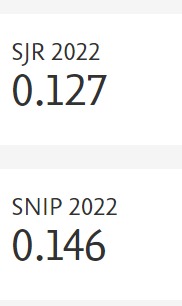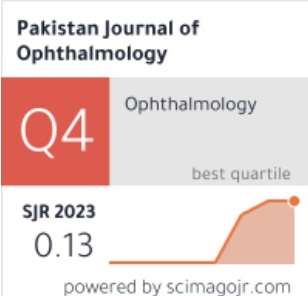Effect of Borish Delayed Refraction on Myopia
Doi: 10.36351/pjo.v41i3.1921
DOI:
https://doi.org/10.36351/pjo.v41i3.1921Keywords:
Accommodation, Subjective refraction, Myopia management, Borish Delayed, Delayed Refraction TestAbstract
Purpose: To evaluate the impact of Borish Delayed Refraction on myopic refraction.
Study Design: Cross sectional study.
Methods: A total of seventy myopic individuals were selected for participation, through convenient sampling, ensuring an equitable gender distribution of 50%. After detailed history and examination, objective and then subjective refraction was performed. To relax accommodation, a modified version of Borish delayed subjective test was used. Fogging allowed prescription of plus powers exceeding +1.00D, enhancing the accuracy of the subjective refraction process.After the application of the Borish delayed method, prescriptions were provided to all seventy subjects for the continued use of corrective spectacles.
Results: The range of refractive error before the Borish Delayed Refraction Test varied from -1.00D to -5.00D, while after the test, it ranged from -0.75 D to -4.00 D. The mean refractive error before the test was -3.0143 ± 1.2D, which reduced to -2.3214 ± 0.99D after the test. A paired t-test was performed for statistical comparison, revealing a significant correlation (p = 0.00) between the pre- and post-test refractive error values.
Conclusion: The Borish Delayed Refraction is potentially useful method for managing myopia. The test offers the possibility for more precise and stable prescriptions by enabling accommodation to relax prior to subjective refraction assessment.
Keywords: Accommodation, Subjective refraction, Myopia, Borish Delayed Refraction.

Downloads
Published
How to Cite
Issue
Section
License
Copyright (c) 2025 Dr. Renu Thakur, Sachitanand Singh

This work is licensed under a Creative Commons Attribution-NonCommercial 4.0 International License.






